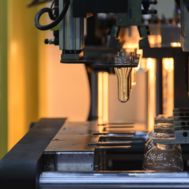
Industries

Applications

Cookie Consent
Cookies are used for statistical purposes and to improve the site.
Cookies will be used after you click "Accept" or if you continue using Dynisco.com
To find out more please review our Privacy Policy.
Polymers exhibit complex flow behaviors that vary under different processing conditions. Unlike Newtonian fluids, they can demonstrate shear thinning, elasticity, and non-linear deformation. To optimize polymer processing techniques such as extrusion, injection molding, and blow molding, it is essential to quantify these behaviors accurately. This is the role of rheological testing.
At Dynisco, we consider rheology the operational language of polymers. By evaluating how polymers flow and deform, we can forecast their behavior in manufacturing environments and end-use applications. This article explores four major categories of rheological testing tools: melt flow indexers, capillary rheometers, rotational rheometers, and online rheology systems.
Melt flow rate (MFR) testing, conducted using a melt flow indexer, is the industry standard for assessing polymer viscosity. Governed by ASTM D1238 and ISO 1133, this method measures the mass of molten polymer that flows through a capillary over ten minutes under specific conditions.
Speed and simplicity: Delivers results within minutes.
Standardized comparability: Enables consistent data across production sites, suppliers, and customers.
Property correlation: Indicates molecular weight and processing behavior.
Dynisco’s LMI6000 Series exemplifies modern melt flow indexers, featuring auto-weight lift, touchscreen interface, and cloud integration for streamlined operation and traceability. These systems remain essential for incoming resin verification and quality assurance.
Capillary rheometers extend beyond a single point measurement, offering comprehensive flow curves over a broad range of shear rates. These instruments replicate processing conditions by extruding molten polymers through precision capillaries.
Complete viscosity profiling: Captures shear-thinning and melt fracture behaviors.
Processing simulation: Mimics high-speed processes like injection molding or film blowing.
Thermal analysis: Examines how viscosity shifts with temperature.
The Dynisco LCR7000 Series, paired with LabKARS software, provides automated control, robust data analysis, and report generation. Capillary rheometers are invaluable for R&D, formulation development, and troubleshooting complex production issues.
Rotational rheometers assess the balance between a polymer’s viscous and elastic responses using cone-and-plate or parallel-plate geometries. These instruments apply controlled shear or oscillatory stresses.
Viscoelasticity: Measures storage and loss modulus (G’ and G”).
Additive impact: Evaluates how fillers, plasticizers, and branching affect flow.
Solid and molten state behavior: Useful for polymers in both processing and end-use conditions.
While typically used in research settings, rotational rheometers offer complementary data to capillary measurements, especially for polymers with significant elastic contributions.
In dynamic manufacturing environments, lab-only testing may be too slow for real-time control. Online rheology systems bring continuous viscosity monitoring to the production floor.
Immediate variability detection: Identify shifts in material properties during extrusion.
Alignment with lab data: Sync real-time measurements with MFR or capillary profiles.
Operational control: Adjust processing parameters to maintain consistency.
Dynisco’s ViscoSensor™ and ViscoIndicator™ are installed inline to deliver ongoing viscosity data, particularly useful in compounding and recycling where input materials vary widely. These tools help stabilize product dimensions, reduce waste, and improve throughput.
Each instrument serves a specific purpose in polymer processing:
Melt flow indexers: Efficient for routine QC and lot certification.
Capillary rheometers: Essential for advanced formulation analysis and troubleshooting.
Rotational rheometers: Critical for viscoelastic characterization in research and specialty applications.
Online systems: Key for real-time production monitoring and adaptive control.
A strategic approach often involves using these tools in combination to cover material qualification, process simulation, and live production control.
Rheological testing equipment transforms polymer flow behavior into actionable data, enabling improved materials, streamlined processes, and consistent product quality.
Dynisco supports the full spectrum of rheological analysis:
LMI6000 Series for rapid, automated MFR testing.
LCR7000 Series for in-depth shear and temperature analysis.
ViscoSensor™ and ViscoIndicator™ for inline, real-time monitoring.
In a global industry that values precision, performance, and sustainability, rheology is more than a test — it’s a foundation for competitive advantage. Contact us today with any questions not answered below.
A melt flow indexer provides a single-point measurement of flow rate under standardized conditions, ideal for quality control. A capillary rheometer delivers a full flow curve across various shear rates, offering deeper insights into processing behavior.
Online rheology enables real-time monitoring of melt viscosity during processing, allowing immediate detection of material changes and adjustment of operating parameters. This reduces defects and improves process consistency.
Use a rotational rheometer when viscoelastic properties (like elasticity, phase angle, or gel behavior) are important, particularly in applications involving soft solids, gels, or materials with complex additives.
Laboratory Mixing Extruder as Spinning Tool to Fibrillate Droplet Phase of Polymer Blend Systems
Correlation of Melt Viscosity of Polyethylene Terephthalate to Solution Intrinsic Viscosity
Characterizing Thermal Stability of Polymer Melts Using a Capillary Rheometer

38 Forge Parkway,
Franklin MA 02038
+1 508 541 9400
Pfaffenstr. 21, 74078,
Heilbronn, Germany
+49 7131 297 0
Lot 3615, Jalan SM 6/8
32040 Seri Manjung, Perak, Malaysia
+605 6884014